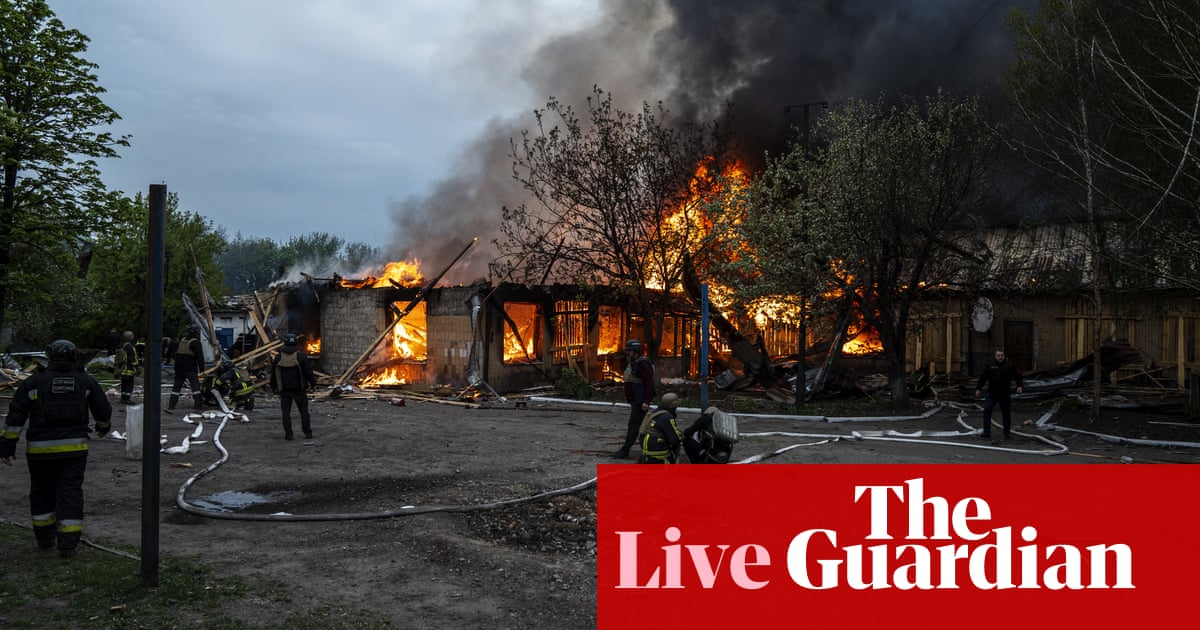US says it is ‘ready to sign’ minerals deal ‘this afternoon’
US treasury secretary Scott Bessent said Washington is “ready to sign” a minerals deal with Ukraine.
At a cabinet meeting at the White House, Donald Trump was asked by a reporter about the deal, which he then directed to Bessent.
“Our side is ready to sign,” Bessent said, adding that the Ukrainians had “decided last night to make some last-minute changes”. He added:
We’re sure they will reconsider that, and we are ready to sign the afternoon.
Bessent said “nothing has been removed” from the agreement.
It’s the same agreement that we agreed to on the weekend. No changes on our side.

Key events
The EU is preparing a “plan B” on how to keep economic sanctions against Russia should the US abandon Ukraine peace talks and seek rapprochement with Moscow.
Kaja Kallas, the EU’s high representative for foreign and security policy, told the Financial Times:
We see signs that they are contemplating whether they should leave Ukraine and not try to get a deal with the Russians because it’s hard.
Kallas said there was a “plan B” to maintain economic pressure on Russia should Hungary block the rollover of EU economic sanctions in July. She stressed that Brussels was still focused on keeping all EU member states aligned.
There is also a plan B but we have to work for plan A; because otherwise you concentrate on plan B and then that will happen.
Here’s more on the reported “last-minute hurdles” that appeared amid reports that Ukraine and the US were poised to sign a minerals deal.
As we reported earlier, Ukraine’s first deputy prime minister Yulia Svyrydenko was due to be in Washington on Wednesday to sign the deal.
But a source told Reuters that the US was pushing Ukraine to sign two additional documents as well as the main minerals deal.
The Trump administration urged Ukraine to sign all three documents connected to the deal, but Kyiv felt they were not ready yet, Politico reported. A source told the outlet:
All three documents need to be signed today, but the Ukrainians are trying to reopen terms which have already been agreed upon as part of the package — this will be up to the Ukrainians, as the US is ready to sign.
The US told Svyrydenko not to travel to Washington on Wednesday unless the agreements were finalised, according to the outlet.
US says it is ‘ready to sign’ minerals deal ‘this afternoon’
US treasury secretary Scott Bessent said Washington is “ready to sign” a minerals deal with Ukraine.
At a cabinet meeting at the White House, Donald Trump was asked by a reporter about the deal, which he then directed to Bessent.
“Our side is ready to sign,” Bessent said, adding that the Ukrainians had “decided last night to make some last-minute changes”. He added:
We’re sure they will reconsider that, and we are ready to sign the afternoon.
Bessent said “nothing has been removed” from the agreement.
It’s the same agreement that we agreed to on the weekend. No changes on our side.
The announcement of the construction of a new road bridge connecting Russia and North Korea comes after reports that about 600 North Korean troops have been killed fighting for Russia against Ukraine.
North Korea has suffered about 4,700 casualties so far, including injuries and deaths, out of a total deployment of 15,000, South Korean lawmakers said on Wednesday, citing the country’s intelligence agency.
In return for dispatching troops and supplying weapons to Russia, North Korea appears to have received technical assistance on spy satellites, as well as drones and anti-air missiles, they said.
Lee Seong-kweun, a member of the parliamentary intelligence committee, told reporters:
After six months of participation in the war, the North Korean military has become less inept, and its combat capability has significantly improved as it becomes accustomed to using new weapons such as drones.
On Monday, North Korea confirmed for the first time that it had sent troops to fight for Russia in the war in Ukraine under orders from its leader, Kim Jong-un.
Russia and North Korea have begun construction of a road bridge between the two countries as part of an effort to strengthen their strategic partnership, Russia’s prime minister, Mikhail Mishustin, said.
Mishustin announced work had started on the bridge across the Tumnen river while in a video meeting with the chair of North Korea’s Supreme People’s Assembly, Pak Thae-song, on Wednesday.
“This is a truly a milestone for Russian-Korean relations,” Mishustin said.
It symbolises our common desire to strengthen friendly, good-neighbourly relations and increase inter-regional cooperation.
The bridge is being built near the existing “Friendship Bridge”, a rail bridge which was commissioned in 1959 after the Korean war.
Pak was quoted as saying:
It will become an eternal historical memorial structure symbolising the unbreakable Korean-Russian friendly relations.
Putin says a small number of Ukrainian troops are still holed up in Russia’s Kursk region
Russian president Vladimir Putin said on Wednesday that some small groups of Ukrainian soldiers were still holed up in basements and hideouts in Russia’s western Kursk region.
Putin earlier this week phoned his top commanders in Kursk to congratulate them on “victory” and the end of their operation to expel Ukrainian forces from the region after a Ukrainian force stormed across the border last August, Reuters reported.
Speaking at an event in Moscow, Putin said radio intercepts suggested that the few Ukrainians left behind were asking commanders to urgently evacuate them to safety.
Ukraine has said that some of its forces are still inside Kursk and in Russia’s nearby Belgorod region.
Russian president Vladimir Putin said on Wednesday that he had no doubt that Moscow would sooner or later repair its relations with European countries.
Speaking at a forum in Moscow, Putin said many in Europe share Russia’s position on certain issues.
Donald Trump and Volodymyr Zelenskyy meeting at Pope Francis’s funeral was “indicative” of the “effort” being put in to secure a peace deal for Ukraine, UK foreign secretary David Lammy has said.
The US and Ukrainian presidents were pictured in discussion at the Vatican over the weekend, having both travelled to Rome for the service, PA reported.
The foreign secretary told the House of Lords International Relations and Defence Committee on Wednesday that Keir Starmer and French president Emmanuel Macron have done “a lot of the heavy lifting” in terms of trying to bring nations together to support any potential future agreement.
It comes as Ukrainian official indicated they are willing to sign a minerals resources agreement with the US, perhaps as soon as Wednesday, with the country’s economy minister in Washington looking to iron out the final technical details.
The meeting between Trump and Zelenskyy on Saturday was the first since their fraught White House encounter earlier this year. In the hours after, the American president appeared to criticise Vladimir Putin, writing on TruthSocial that the Russian leader could be “just tapping me along”.
The United States wants Ukraine to sign two additional documents together with their minerals deal, a source familiar with the matter said on Wednesday.
However, Kyiv thinks the two supplements need more work, Reuters reported.

Jakub Krupa
… and on that note, that’s a wrap from me, Jakub Krupa, but I leave you with Tom Ambrose who will guide you through the evening and bring you all the latest updates on the minerals deal.
Russia’s ceasefire proposal in fact seeks concessions to help Putin’s war machine, Zelenskyy’s top aide warns
As we wait to hear more on the US minerals deal, let me bring you new comments from Andriy Yermak, head of the Ukrainian presidential office.
Writing for the Guardian, Yermak, Volodymyr Zelenskyy’s most senior aide, explained Moscow’s seemingly contradictory logic as Russia calls for a three-day ceasefire in May, while stalling on a longer ceasefire and proper peace talks.
He said:
On Monday, the Kremlin offered a three-day pause in hostilities against Ukraine in May, to coincide with Moscow’s celebrations of the end of the second world war.
In a context where Ukraine is calling for an unconditional 30-day ceasefire, and the US a permanent one, Russia wants concessions before a lasting pause or permanent peace can even be discussed.
Central to the Kremlin’s demands is the removal of sanctions – especially those restricting its aviation sector.
We must be cautious not to make concessions prematurely, under the guise of quick progress. The short pause offered would not make a meaningful difference to the war, and accepting it would enable a regime that has repeatedly shown intent to prolong its war of aggression and undermine this chance for a just, fair and lasting peace.
Yermak went on to explain the problem with removing the requested sanctions, saying that “the apparent humanitarian and economic nature of Russia’s request masks the political and military advantage that any softening of aviation sanctions would hand the Russian president and his war machine.”
You can read his comment in full here:

Jakub Krupa
There’s a lot of conflicting reporting on when the minerals deal could be signed, and if it really could be as early as today – as some reports suggested earlier (14:33).
In the last few minutes, the Financial Times (£) said that the talks “ran into last-minute hurdles,” as a US source told the newspaper that the “negotiations had not concluded because Ukraine had sought to revisit terms agreed at the weekend.”
We will keep an eye on this for you and bring you all the latest updates here.
Ukrainian PM says Kyiv ready to sign minerals deal ‘within 24 hours’
Ukrainian prime minister Denis Shmyhal has offered his take on the US minerals deal, with Reuters reporting his comments that the reworked agreement has become a “real partnership deal”.
He said the deal is to be signed within the next 24 hours, with two additional agreements to follow.
Shmyhal added that the deal will have to be ratified by the Ukrainian parliament, with consultations set to start tomorrow, Reuters said.
He added that future US aid for Ukraine can be considered as part of US contribution to the investment fund to be established under the deal, according to Reuters.
Let’s wait for more details or, ideally, the full text of the deal though.
It is believed that the text has evolved significantly since the first attempt at signing it in February, which ended with that Oval Office spat between Trump, JD Vance and Zelenskyy.
Kremlin claims Russia’s Putin open to ending its war in Ukraine, but it’s complex
Elsewhere, the Kremlin claimed that president Vladimir Putin was open to peace despite its continuing aggression on Ukraine, but stressed that the conflict is so complicated that the rapid progress that Washington wants is difficult to achieve, Reuters reported.
Kremlin spokesperson Dmitry Peskov insisted that Putin “remains open to political and diplomatic methods of resolving this conflict” started by Russia.
But news agency TASS quoted Peskov as saying that the root causes of the war were too complex to be resolved in one day.
After the Kremlin’s remark, Ukrainian foreign minister Andrii Sybiha said Kyiv was ready for peace talks in any format if Moscow signed up to an unconditional ceasefire, Reuters noted.
Ukraine expects to sign US minerals deal today, reports say
Ukraine expects to sign a much-anticipated minerals deal with the United States on Wednesday, a senior source in the Ukrainian presidency told AFP.
Deputy prime minister and economy minister Yulia Svyrydenko will be in Washington later to sign the agreement, the final draft of which the Ukrainian government “has yet to approve”, the source said, adding that the agreement provides for a “50/50” joint fund between Kyiv and Washington.
Reuters reminded that the two sides signed a memorandum on 18 April as an initial step towards clinching an accord on developing mineral resources in Ukraine.
Ukrainian officials hope that signing the deal promoted by U.S. President Donald Trump will help to firm up softening American support for Kyiv in the war triggered by Russia’s full-scale invasion more than three years ago, Reuters added.
What happens next for Merz’s government? – analysis

Kate Connolly
The way is now paved for the Merz administration to finally take up office.
On Monday, the coalition agreement will be signed, and we’re also expecting the SPD to announce its cabinet posts. Then on Tuesday, Merz is due to be voted into office by the Bundestag, after which his government will be sworn in.
Rumour has it that Merz will hold his first cabinet meeting on Tuesday afternoon, sending out the signal that he means to get down to business straight away amid looming challenges, from economic malaise, to grave domestic concerns, such as how to tackle irregular migration, overburdensome bureaucracy, and not least how to outflank the far-right AfD (recent polls showing them to have overtaken the CDU/CSU for the first time).
There’s also the question that has been on the minds of everyone since his controversial multi-billion Euro financial bonanza he pushed through parliament in March – what exactly is he going to do with the money, and how long will it be before malcontent Germans start to feel the effects of it?
That’s even before touching on the myriad geopolitical complications.
Merz has long since sent out the signal that Ukraine will be at the top of his agenda, having appointed a pro-Kyiv ex soldier as foreign minister and pledged to continue Germany’s support.
The closer he has got to taking office, the more cautious he has become in his rhetoric towards US President Trump, but Merz has made no mistake he knows what is at stake, saying on Monday:
“We have come to the realisation that we can no longer be certain of the transatlantic relationship in the spirit of freedom and the rules-based order.”
German coalition deal vote reveals ‘scepticism’ among some in SPD over being in government – analysis

Kate Connolly
With this morning’s news that the Social Democrats’ party base has voted in favour of the party’s coalition agreement with the conservative CDU/CSU alliance, the last hurdle has finally fallen for the long awaited new German government to be formed, ending six months of grindingly painful political gridlock and (hopefully also) the chronic national ennui.
Almost 85% were in favour of the deal, which at first glance looks high, yet, voter participation among the 358,000 members of Germany’s oldest political party was only 56%, itself a clear expression of the disgruntlement – or, as the SPD’s general secretary Matthias Miersch put it this morning, at the briefest of press briefings at the SPD’s headquarters, the Willy Brandt Haus, in Berlin – the “scepticism” many members feel about participating at all in this new administration.
After all, the SPD, after three years of being at the helm under Chancellor Olaf Scholz, is now the junior partner in the new government of Friedrich Merz, and the fear within the party is that its already diminished profile in the political landscape – having delivered its worst ever election result in February – will become even more watered down, as will its ability to imprint its social democratic principles on Europe’s biggest economy.
“Yes, there is scepticism,” Miersch admitted, and many “open-ended questions”, but hopefully, he added, “this scepticism can be dispelled” once the government gets to work, stressing: “es geht nicht um uns, es geht um das Land” – “this isn’t about us, it’s about the country”. He thanked party members for their support and “trust especially in these times of great uncertainty”.
This is certainly the tenor of the new era. As Merz said on Monday, presenting his new ministers, this is “no time for euphoria”

